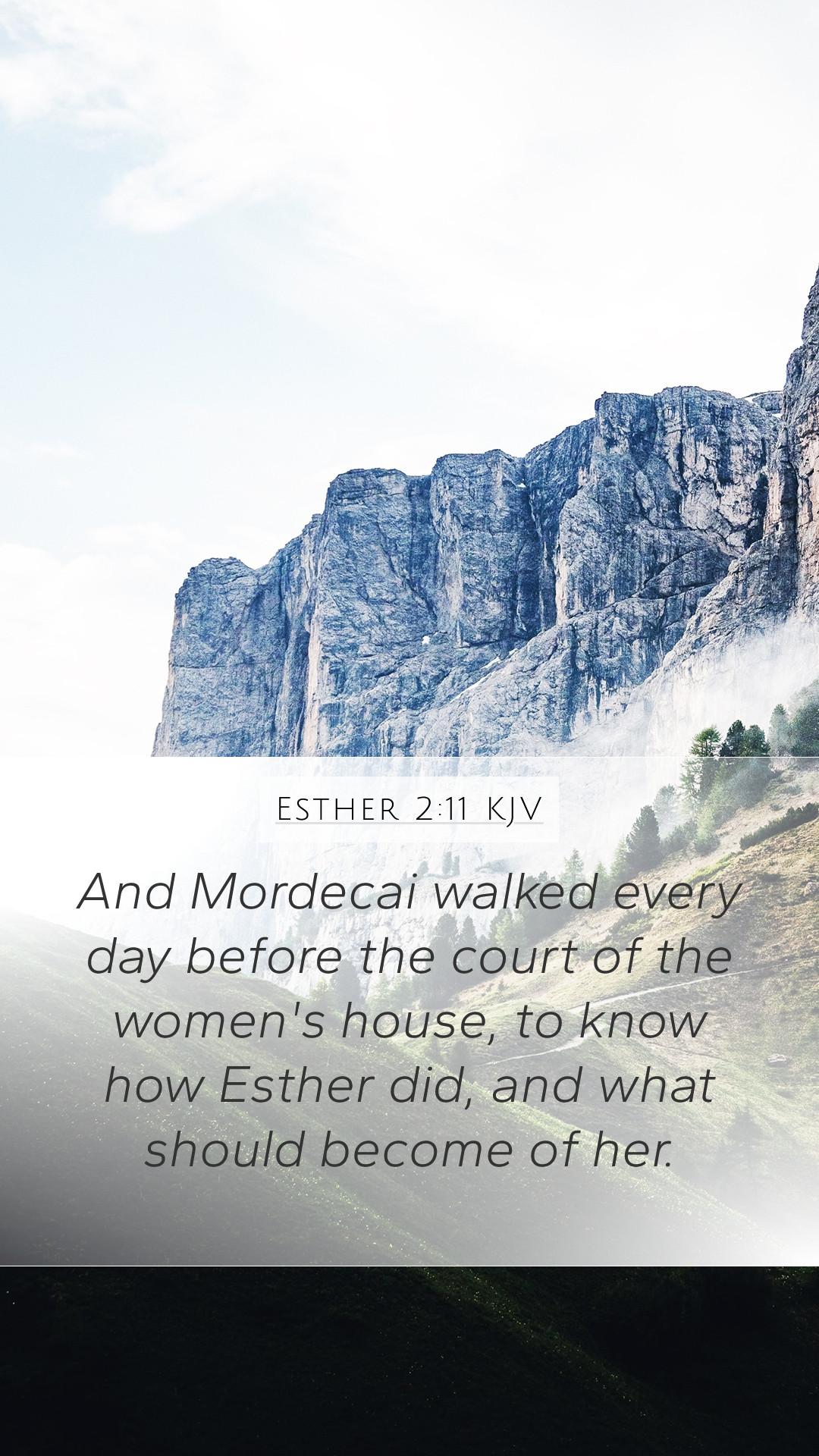Old Testament
Genesis Exodus Leviticus Numbers Deuteronomy Joshua Judges Ruth 1 Samuel 2 Samuel 1 Kings 2 Kings 1 Chronicles 2 Chronicles Ezra Nehemiah Esther Job Psalms Proverbs Ecclesiastes Song of Solomon Isaiah Jeremiah Lamentations Ezekiel Daniel Hosea Joel Amos Obadiah Jonah Micah Nahum Habakkuk Zephaniah Haggai Zechariah MalachiEsther 2:11 Meaning
What is the meaning of Esther 2:11?
And Mordecai walked every day before the court of the women's house, to know how Esther did, and what should become of her.
Esther 2:11 Bible Verse Meaning
Examining Esther 2:11 - A Comprehensive Bible Verse Commentary
Bible Verse: Esther 2:11 - "And Mordecai walked every day before the court of the women’s house to know how Esther did and what should become of her."
Esther 2:11 offers a poignant glimpse into the relationship between Mordecai and Esther and highlights the underlying themes of concern, loyalty, and the implications of personal choices in the unfolding narrative of the Jewish people in exile.
Meaning and Interpretations
This verse serves as a significant focal point in understanding the dynamics of Esther's situation. It reveals Mordecai’s vigilant care for Esther, who was now among the king’s selections. The implications of this verse extend far beyond the literal actions described, revealing insights that can be explored through various biblical commentaries.
Mordecai's Role and Significance
Mordecai's daily visits to the court signify his concern and protective instinct towards Esther. He desires to remain informed about her well-being and position, which indicates the depth of their bond. According to Matthew Henry, Mordecai’s actions can also be seen as an act of loyalty and guardianship. It shows the importance of familial ties and the responsibilities one holds towards loved ones.
Albert Barnes emphasizes Mordecai's commitment. His actions reflect the broader theme of God’s providence in the narrative; it indicates that he trusts in God’s plan for Esther despite the uncertainties they face in the king’s court. His vigilance mirrors the larger parent-child dynamics that serve to protect and nurture in the realm of faith.
The Historical Context
Understanding the historical context in which this verse is situated is crucial for deeper comprehension. As Adam Clarke notes, the events occur during the Persian Empire, a time when the Jewish people faced systemic challenges and danger. This awareness adds an extra layer to Mordecai's vigilance; it shows his awareness of the potential risks that Esther faces.
Key Themes in Esther 2:11
- Loyalty: Mordecai’s commitment to Esther highlights the crucial value placed on loyalty within familial relationships.
- Providence: The overarching theme of divine intervention in the lives of the characters points to God’s continued guidance and support.
- Concern and Care: Mordecai’s daily visits convey the importance of providing support and showing care for loved ones.
Applications for Daily Life
Esther 2:11 extends beyond its historical narrative, offering various applications for contemporary readers. For those seeking Bible verse meanings and understanding Scripture, the themes of loyalty and care applicable to personal relationships resonate strongly with believers today.
The verse encourages individuals to embody the spirit of vigilance and care exhibited by Mordecai, which can be applied to nurturing relationships within families and communities. Seeking the well-being of others embodies the teachings found throughout Scripture.
Cross References to Consider
- Esther 2:5-7: This passage provides context for Mordecai’s relationship with Esther and their family background.
- Proverbs 3:5-6: The wisdom in trusting the Lord aligns with Mordecai's faith in God's plan through Esther.
- Psalms 37:5: "Commit your way to the Lord; trust in him and he will do this." Reflects Mordecai’s trust in God's providence.
Conclusion
Esther 2:11 serves as an insightful verse that encapsulates essential themes of loyalty, care, and the unfolding of God’s providential plan. The reflections from esteemed biblical commentaries such as those by Matthew Henry, Albert Barnes, and Adam Clarke provide valuable tools for anyone engaging in Bible study insights and practical applications. By exploring the meaning of this verse, readers can gain profound insights into the nature of relationships and divine providence, both within the story of Esther and in their everyday lives.


